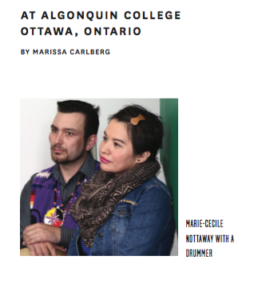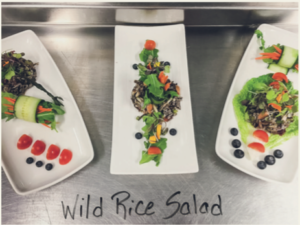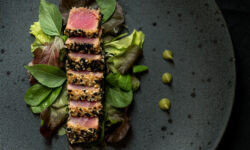Focusing on First Nations Cookery & Culture
 With a focus on indigenous foods, culture, history, and the preservation of indigenous values, Algonquin College is Canada’s first college offering an Indigenous Cook Pre-Apprenticeship Program. Canadian students taking part in the program receive an education they can bring back to their home communities, and beyond. Developed by Wes Wilkinson—Academic Manager for Algonquin College’s School of Hospitality and Tourism—the curriculum provides students with an education in the hospitality industry while reconnecting indigenous youths with their cultures.
With a focus on indigenous foods, culture, history, and the preservation of indigenous values, Algonquin College is Canada’s first college offering an Indigenous Cook Pre-Apprenticeship Program. Canadian students taking part in the program receive an education they can bring back to their home communities, and beyond. Developed by Wes Wilkinson—Academic Manager for Algonquin College’s School of Hospitality and Tourism—the curriculum provides students with an education in the hospitality industry while reconnecting indigenous youths with their cultures.
Wilkinson is an esteemed chef who has held a variety of positions in the culinary industry: from sous chef to television cook- ing host to vice-president in research and development for big grocery names such as President’s Choice and Sobeys. Supporting the program are consultants like Chef Marie-Cecile Nottaway of Wawatay Catering, a graduate of Algonquin College herself. From an idea born of Wilkinson’s research for his master’s thesis on the topic of Aboriginal-Centric education in the college system, he concluded that only 4-6% of graduates from hospitality and tourism programs were indigenous students. Wilkinson wasn’t surprised. “Of course, it makes sense. Why would I leave a reserve to go to a big school? Then learn how to make hollandaise sauce, and go back to the reserve…there’s a disconnect with that.”
It was after completing his thesis that Wilkinson brought his plans for the program to the Deans’ Council at Algonquin College. The feedback from the Canadian community has been enthusiastic. The full-time program is open to anyone who has surpassed grade 10, and there has been interest from all over the country.  The first 15 weeks of the program focus on skills upgrading. The next 12 weeks is a Level 1 apprenticeship, which takes place in school. Hot food preparation, an introduction to baking, and trade calculations are a few of the sub- jects covered and the third and final tier involves an eight-week work placement in the Ottawa foodservice industry. Indigenous culture informs every element of the program. Wilkinson has constructed the curriculum along with consultants to ensure it is entirely authentic, from the foods used to the physical space in which they work. Ingredients throughout the program include beaver, moose, arctic char, wild rice, and bannock. All ingredients are sourced from local Ottawa vendors, as well as from some partner reserves.
The first 15 weeks of the program focus on skills upgrading. The next 12 weeks is a Level 1 apprenticeship, which takes place in school. Hot food preparation, an introduction to baking, and trade calculations are a few of the sub- jects covered and the third and final tier involves an eight-week work placement in the Ottawa foodservice industry. Indigenous culture informs every element of the program. Wilkinson has constructed the curriculum along with consultants to ensure it is entirely authentic, from the foods used to the physical space in which they work. Ingredients throughout the program include beaver, moose, arctic char, wild rice, and bannock. All ingredients are sourced from local Ottawa vendors, as well as from some partner reserves.
The environment in the classroom reflects that of a native community. Wilkinson has given creative freedom to instructors, all of whom come from different indigenous backgrounds. They are encouraged to incorporate traditional proceedings and values into the lessons. Integrating practices—such as smudging and forming circles within the classroom—is done in the hopes of maintaining each student’s connections to their indigenous roots.
Given the uniqueness of the program, there were bound to be obstacles, such as making the program accessible to all students. Wilkinson explains that in today’s college system, most courses assume students will have access to a laptop. Thus allowing for portions of course material to be taught online, as well as the use of online resources which anchor to the program while students are not at school. He explains that there are students in this program that might not only lack a person- al computer, there might not be connectivity from their reserve back home. This is a revelation that is integral to structuring the course in the future. Algonquin College has taken the bold first steps to creating customized solutions for indigenous students. Indigenous peoples in Canada have struggled to find relevancy in the mainstream college system.
“Colleges and universities are starting to wake up and say we need to start doing some things for indigenous people instead of teaching them the dominant society’s education.” Wilkinson is optimistic.









